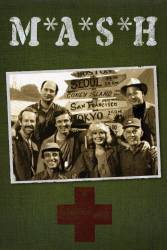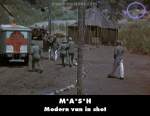Deliberate mistake: With the show having lasted longer than the war, the producers apparently decided to turn back the clock to the very beginning of the War (June 25, 1950). To do this, it seems they have tried to make things as confusing as possible, intentionally mixing up facts, even when this openly contradicts the facts as presented in earlier episodes. For example, both B.J. and Potter arrived in or about mid 1952, but now are in the O.R. when the Chinese launch their massive offensive on 1st Nov. 1950, almost two years earlier. Trapper and Blake, who were there for the Army Navy Game which would have occurred Nov. 25 1950, are not. Many of the supporting clips also are too early or late for the events being discussed. For example, Winston Churchill's speech must have been before August 28 when the first British troops started arriving, likely also before the Canadians in July 1950, but the first MASH Unit was not set up in Korea until September 1950. Truman's speech to University of Wyoming students is actually from May 9 1950, a month and a half before the beginning of the conflict and 5 months before the first MASH was established, but the clip about his "Whistle Stop Tour" must be from the 1948 campaign. MacArthur's speech, on the other hand, is in response to the ticker tape parade of April 22 1951 when he was replaced.

M*A*S*H (1972)
1 deliberate mistake in season 4 - chronological order

Visible crew/equipment: In the opening scene where General Clayton is explaining the 4077 to the psychiatrist, the scene changes to the outdoor set and the camera pans to the right. As the camera pans past the hospital, a white 1970s era shuttle van can be seen driving into the set in the upper right corner of the screen. (00:01:35)
Frank Burns: You disgust me!
Hawkeye: You're right, Frank... I discussed you with everyone I know and we all find you disgusting.
Trivia: There were no American planes shot down over the Sea of Japan during the Korean conflict. It is rumoured that producer/director Larry Gelbart knew that, but wrote Henry Blake's death scene as he was very unhappy with the way Mclean Stevenson had left the show, and was determined to make it clear that there was no way he would be coming back.
Join the mailing list
Separate from membership, this is to get updates about mistakes in recent releases. Addresses are not passed on to any third party, and are used solely for direct communication from this site. You can unsubscribe at any time.
Check out the mistake & trivia books, on Kindle and in paperback.




Answer: It is actually Cencompac for Central Command of the Pacific. It is like the headquarters for all military activity in the Pacific Region (Japan, Korea, Okinawa, etc. The newer version of that is United States Pacific Command (USPACOM).
EMTurbo
And the abbreviations were used mainly by the Navy. Especially CENCOMPAC.
Https://en.wikipedia.org/wiki/United_States_Indo-Pacific_Command.